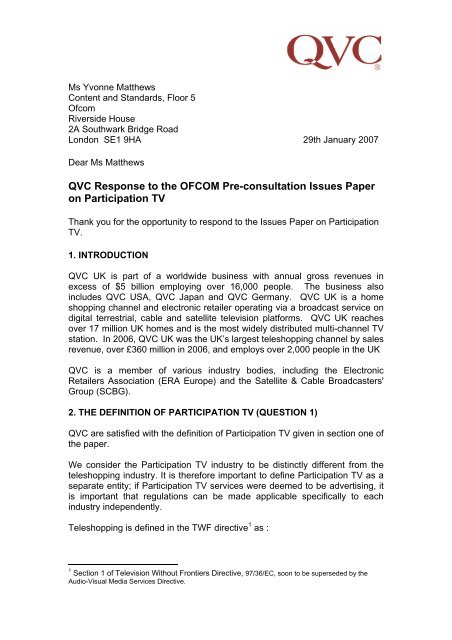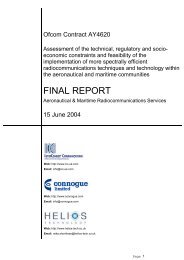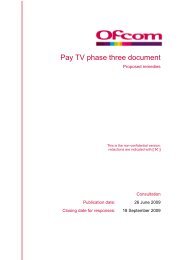QVC - Stakeholders - Ofcom
QVC - Stakeholders - Ofcom
QVC - Stakeholders - Ofcom
You also want an ePaper? Increase the reach of your titles
YUMPU automatically turns print PDFs into web optimized ePapers that Google loves.
Ms Yvonne Matthews<br />
Content and Standards, Floor 5<br />
<strong>Ofcom</strong><br />
Riverside House<br />
2A Southwark Bridge Road<br />
London SE1 9HA<br />
Dear Ms Matthews<br />
29th January 2007<br />
<strong>QVC</strong> Response to the OFCOM Pre-consultation Issues Paper<br />
on Participation TV<br />
Thank you for the opportunity to respond to the Issues Paper on Participation<br />
TV.<br />
1. INTRODUCTION<br />
<strong>QVC</strong> UK is part of a worldwide business with annual gross revenues in<br />
excess of $5 billion employing over 16,000 people. The business also<br />
includes <strong>QVC</strong> USA, <strong>QVC</strong> Japan and <strong>QVC</strong> Germany. <strong>QVC</strong> UK is a home<br />
shopping channel and electronic retailer operating via a broadcast service on<br />
digital terrestrial, cable and satellite television platforms. <strong>QVC</strong> UK reaches<br />
over 17 million UK homes and is the most widely distributed multi-channel TV<br />
station. In 2006, <strong>QVC</strong> UK was the UK’s largest teleshopping channel by sales<br />
revenue, over £360 million in 2006, and employs over 2,000 people in the UK<br />
<strong>QVC</strong> is a member of various industry bodies, including the Electronic<br />
Retailers Association (ERA Europe) and the Satellite & Cable Broadcasters'<br />
Group (SCBG).<br />
2. THE DEFINITION OF PARTICIPATION TV (QUESTION 1)<br />
<strong>QVC</strong> are satisfied with the definition of Participation TV given in section one of<br />
the paper.<br />
We consider the Participation TV industry to be distinctly different from the<br />
teleshopping industry. It is therefore important to define Participation TV as a<br />
separate entity; if Participation TV services were deemed to be advertising, it<br />
is important that regulations can be made applicable specifically to each<br />
industry independently.<br />
Teleshopping is defined in the TWF directive 1 as :<br />
1<br />
Section 1 of Television Without Frontiers Directive, 97/36/EC, soon to be superseded by the<br />
Audio-Visual Media Services Directive.
“direct offers broadcast to the public with a view to the supply of goods or<br />
services, including immovable property, rights and obligations, in return for<br />
payment”<br />
While we note that Participation TV could technically fit within this definition<br />
we would point out that teleshopping could also technically fit within the<br />
definition of television advertising given within the same directive; it is clear,<br />
however, that due to the distinct differences between traditional television<br />
advertising and teleshopping, there is a need to separate the two to ensure<br />
that they are correctly regulated.<br />
We consider the same is true of teleshopping and Participation TV. If the two<br />
are not clearly defined at this stage, problems could arise in regulating them<br />
effectively.<br />
3. THE PROPOSED SCOPE OF THE FORMAL CONSULTATION<br />
(QUESTION 2)<br />
<strong>QVC</strong> are satisfied with OFCOM’s proposed scope of the consultation; namely<br />
that it will cover television services that rely wholly or mainly on viewers<br />
paying for an opportunity to participate in the service. We agree that the<br />
means of participation be widened beyond premium rate telephony to<br />
encompass new payment methods.<br />
We also agree that, where it is clear that PRS contributes to the editorial<br />
content of the programme, it should not be included in the scope of the 2007<br />
consultation. We would suggest, however, that safeguards are introduced to<br />
ensure this provision is not used as a loophole by Participation TV services to<br />
circumnavigate the new regulatory system that results from the consultation.<br />
4. POSSIBLE REGULATORY APPROACHES (QUESTION 4)<br />
<strong>QVC</strong> considers that options A and B represent the only viable regulatory<br />
approaches.<br />
We consider that Option C would encourage Participation TV services to<br />
amend their services to ensure they fell within either editorial or advertising,<br />
depending on which regulations were more favourable. Furthermore, it would<br />
add an extra burden to the regulator having to decide in which category a<br />
Participation TV service fell in and extend the amount of time it takes for the<br />
regulator to stop practices that are in breach of their code.<br />
We do not understand how Option D could work in harmony with the<br />
separation principle. Furthermore, as with Option C, we consider Option D<br />
would cause an extra regulatory burden and would cause confusion as to<br />
which regulator should be taking action; it could also lead to inconsistency in<br />
decisions between regulators. It would also dilute the ASA’s “one stop shop”
concept, as the public would have to contact different regulators depending on<br />
the nature of the offence.<br />
We consider that the most important function of the 2007 consultation will be<br />
to identify whether Participation TV should be considered as editorial or<br />
advertising so that resulting regulations can be applied both efficiently and<br />
effectively.<br />
5. CHANGES TO THE CODES (Question 5)<br />
<strong>QVC</strong> does not understand how, due to their quintessential commercial nature,<br />
Participation TV services can be considered as editorial. We consider they<br />
currently breach a number of rules in Section 10 of the Broadcast Code.<br />
Clarification is needed as to why Participation TV services are not considered<br />
in breach of various rules in Section 10, most notably rules 10.2, 10.3 and<br />
10.4. Nevertheless, if Participation TV services were to be considered as<br />
editorial, we consider a number of changes would be necessary to the<br />
Broadcast Code.<br />
Rule 2.2 of the Broadcast Code should be expanded to ensure that claims did<br />
not have to result in harm or offence to be considered misleading.<br />
Furthermore, we consider that while Rule 2.11 could encompass a number of<br />
potential offences of disingenuous Participation TV services, a guidance note<br />
should be issued to clarify practices that are either likely or certain to breach<br />
the rule. We also consider that new rules may need to be added to regulate<br />
specific types of Participation TV services.<br />
We do not consider that, in relation to Participation TV services, the BCAP<br />
Code needs to be amended. Unlike the Broadcast Code, the BCAP Code was<br />
designed to regulate content that was primarily of a commercial nature. We<br />
note that a number of Participation TV services would be prohibited under the<br />
BCAP Code if they were considered advertising. We consider, however, that<br />
the BCAP Code prohibits these types of advertisements for good reason and<br />
that it would be paradoxical for the BCAP Code to be altered just to ensure<br />
the survival of these services. We consider that other elements of<br />
Participation TV that are currently the cause of public concern could be dealt<br />
with under the current provisions for misleading advertising.<br />
Furthermore, the process of reviewing and amending the BCAP Code is<br />
currently being undertaken by BCAP and we consider that any necessary<br />
amendments will be identified in that review. We believe that to be the correct<br />
forum for BCAP Code changes.<br />
We consider it is possible that because Participation TV is in its infancy there<br />
may be regulatory issues that will not be identified by the 2007 consultation<br />
which become apparent in the future. We think it is important therefore that,<br />
regardless of whether it is defined as advertising or editorial, these services<br />
are clearly defined as a distinct form of editorial/advertising so that rules can
e added to the Broadcast Code/BCAP Code which are specifically applicable<br />
to Participation TV services.<br />
We would also recommend that OFCOM/ASA consult ICSTIS to ensure they<br />
have a common approach when regulating Participation TV services.<br />
Yours sincerely<br />
Danny Bugler<br />
Advertising Standards Compliance Officer<br />
danny_bugler@qvc.com

















